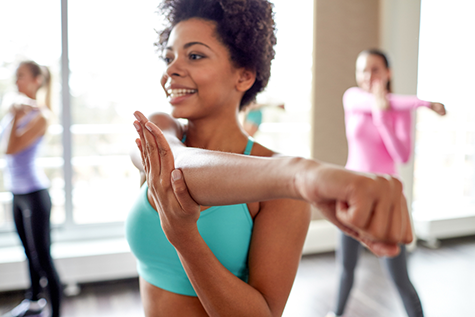
For every woman, exercise is an essential part of staying well. It not only helps reduce your risk for many general and women's health conditions but also boosts your mood and improves your overall sense of well-being.
Even more, exercise can be adapted to support your specific stage of life. From adolescence to healthy pregnancy to menopause and aging, talk to your OB GYN about how exercise can help you stay healthy. Then, use these tips to choose the exercises that benefit your health at every age and stage.
Adolescence
In general, teenage girls should aim for at least 60 minutes of physical activity every day. Many adolescents find organized sports provide the exercise they need. But choosing any physical activity that teens enjoy is most important to keep them involved and active.
According to the CDC, exercise offers several physical benefits for teens, including strengthening muscles and bones, improving heart and lung health, maintaining a healthy body weight, and reducing the long-term risk of chronic conditions. In addition, routine exercise helps teens improve attention and memory, which can support academic performance, and reduces the risk of mental health conditions like depression.
Menstrual cycle and PMS
For many women, their menstrual years come with a variety of premenstrual symptoms that affect them physically and emotionally. Several studies have investigated the link between exercise and PMS symptoms.
A study in BMC Women's Health followed women who consistently participated in aerobic exercise for a period of eight weeks. The women reported reduced PMS symptoms, including fewer headaches, gastrointestinal symptoms, and swelling. Another study published in the Journal of Education and Health Promotion found that women who did yoga three times a week for 40 minutes reported a significant reduction in symptoms.
Pregnancy
If you are in good health and don't have any pregnancy risks or complications, it's typically safe to continue to exercise during pregnancy. In fact, the American College of Obstetricians and Gynecologists says some benefits of exercise during pregnancy include easing back pain, reducing the risk of conditions like gestational diabetes, and maintaining healthy weight gain.
Your OB GYN is your best resource to understand which exercises are beneficial and what to avoid. For example, talk to your OB GYN before doing any high-contact sports or activities with a high risk of falling. You may also need to modify the way you do yoga poses or pay special attention to balance as your belly grows.
Perimenopause
Numerous studies have looked at the effects of exercise as women transition to and reach menopause. Along with the general health benefits of weight control and mental well-being, some studies have found a potential link between exercise and reducing bothersome symptoms during this stage of life.
In Menopause, a nine-year study of women ages 45-55 found that those who reported not exercising every day were more likely to also report hot flashes. Another study found that a 12-week structured exercise program helped women ages 40-60 get a significant improvement in common perimenopause symptoms.
After menopause
After a women reaches menopause, she often experiences an increased risk for several common health conditions, such as heart disease, certain types of cancer, stroke, and osteoporosis. In some cases, exercise is a tool to help proactively address these risks.
According to the Office on Women's Health, getting at least 30 minutes of exercise each day is one of the best ways for postmenopausal women to stay healthy. Aerobic activities are a good choice for your heart and vascular health. Strengthening exercises are also beneficial, especially to maintain your bone health as you age.
Guidance for every age
Each women's exercise and health needs are unique as she journeys through life's different stages. If you're unsure where to start when it comes to exercise, remember to talk to your OB GYN or primary care provider. These health professionals can guide you on how to exercise based on your health history, current health conditions, and overall health goals.
